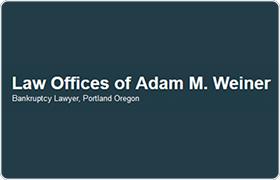Canby Collection Lawyer, Oregon
Sponsored Law Firm
-
 x
x

Click For More Info:
-
Law Offices of Adam M. Weiner
8624 SE 13th Ave Portland, OR 97202» view mapBankruptcy & Debt Premier Bankruptcy Attorney
Life doesn’t always have to be hard. Consult with a bankruptcy attorney who looks out for your best interests. Call today to begin the process for a fresh financial start.
503-719-5123
Adam M. Weiner
✓ VERIFIEDBankruptcy & Debt, Credit & Debt, Collection
Adam Weiner has been practicing law in Oregon since May 1998. After successfully spending many years representing individuals in different types of... (more)
A. Richard Vial
Construction, Aviation, Civil Rights, Collection
Status: In Good Standing Licensed: 43 Years
Amber N Wolf
Bankruptcy, Employment, Collection, Credit & Debt
Status: In Good Standing Licensed: 22 Years
Arusi R Loprinzi
Labor Law, Civil Rights, Contract, Collection
Status: In Good Standing Licensed: 51 Years
Arusi Robert Loprinzi
Labor Law, Civil Rights, Contract, Collection
Status: In Good Standing Licensed: 51 Years
August Eric Klatt
Federal, Family Law, Collection, Personal Injury
Status: In Good Standing Licensed: 48 Years
Christopher Michael Veley
Contract, Collection, Environmental Law Other, Civil Rights
Status: In Good Standing Licensed: 25 Years
Courtney Allen Cross
Federal, Credit & Debt, Collection, Bankruptcy & Debt
Status: In Good Standing Licensed: 30 Years
Damon J Petticord
Civil Rights, Insurance, Collection, Personal Injury
Status: In Good Standing Licensed: 28 Years
 Adam M. Weiner Portland, OR
Adam M. Weiner Portland, OR Practice AreasExpertise
Practice AreasExpertise

